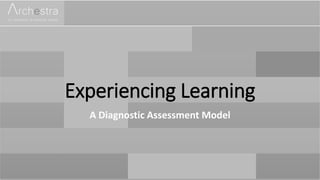
Experiencing learning
- 1. Experiencing Learning A Diagnostic Assessment Model
- 2. “Knowledge” A degree of … recallable awareness of … why and when … a “what” is “how” Translation: the recognition of something in particular, and what it means, in a given context, along with how that meaning is generated. • Anything we “know” includes our familiarity with a context, an identity, and an effectiveness, of a given idea. • Before we know something, we are not aware of one or more of those three aspects. “Learning” – The transition from Not Knowing to Knowing
- 3. How do we determine that we are “learning”? It might seem difficult to distinguish learning (the experience) from the many other phenomena that involve it – including thinking, communicating, or other efforts that create a difference between previous awareness and subsequent awareness. We casually say that the effect of any of those efforts, however specifically different they feel from each other as events, is that we “learned” something. The general experience is always the same: “acquiring knowledge”. The “acquisition” must in some way be demonstrable as “completed” before we say that we have learned. But what we expect, from review of past experience, is that the final actual “acquired” may not match the initial potential “acquirable”, and that the beginning to end progression of efforts in acquisition is elastic: each different phase of progress can occur at a pace different from each other as well as differently from any current effort to the next. Despite that variability we can see a basic, distinctive and recurring pattern of the overall progression has ; and at how influences on the progression can cause its variability, originating outside of or inside of the pattern itself.
- 4. EXPERIENCING LEARNING = “GRASPING” A CONCEPT The grasping: • Recognition • Explanation • Demonstration • Application The experiences: • Exploration • Training • Coaching • Managing ©2018 Malcolm Ryder / Archestra Research
- 5. Exploration exposes ideas in a way that allows the subject audience to: • Pay and maintain attention • Comprehend in their own language • Create and leverage memory through relevance • Re-iterate (present findings) in sharable ways Exploration includes respecting that: • Prior interest may not already sufficiently exist • Attention is selective • Associations may be counterproductive • Communication is also emotional Much of the potential for grasping concepts begins with whether the source of information can handle how the audience already feels. ©2018 Malcolm Ryder / Archestra Research
- 6. Training provides support for the person to: • Re-envision themselves • Adopt the new version as a personal goal • Prepare for sustainable changes • Manage change efforts Training calls for both empathy and sympathy with the trainee: • Self-image is a result of many influences • Intent can be based on unrealistic preferences • Trust will need to be justified • Discipline is a prerequisite and is expensive Those variables collectively precondition the circumstances in which training would occur. ©2018 Malcolm Ryder / Archestra Research
- 7. Coaching creates and presents a guide for an active "practicer" (not practitioner) to: notice outcomes evaluate outcomes as signals respond to the signals with refined decisions about action and take the freshly focused actions with intent to repeat the cycle that starts with noticing outcomes Coaching includes respecting that: • predispositions exist before the coaching starts; • unfamiliarity may kick in with the recognition of outcomes; • contexts may need to be prioritized and "sold" in order to really activate evaluation; • and support must be offered to fortify motivation to take the next action. Those potential barriers must be solved. ©2018 Malcolm Ryder / Archestra Research
- 8. Managing provides a way for the learner to use timely feedback to: • Find out what helps or hurts progress • Relate changes to intentions • Decide what to focus on • Decide how to next use what is gained Managing respects that actual effectiveness and desired effectiveness may differ: • Degree of difficulty can cause hesitation or interruption • Motivation can be dependent on perceived usefulness • Goals may be ambiguous or speculative • Learner may have competing commitments ©2018 Malcolm Ryder / Archestra Research
- 9. Learning experiences range from being entirely self-service to entirely facilitated by 3rd parties, and the approaches may be blended as well. Time and energy expended in any of the experiences depends on what discoveries are made about how the experience becomes effective for progress. The Learner experiences “progress” in learning as a sense of increased autonomy and authority in completing the cycle from initial recognition to potential application of concepts. The experiences of learning: • Exploration • Training • Coaching • Managing ©2018 Malcolm Ryder / Archestra Research
- 10. Archestra notebooks compile and organize decades of in-the-field and ongoing empirical findings. All presented findings are derived exclusively from original research. Archestra notebooks carry no prescriptive warranty. As ongoing research, all notebooks are subject to change at any time. ©2018 Malcolm Ryder / Archestra Research www.archestra.com mryder@archestra.com Archestra research is done from the perspective of strategy and architecture. With all subject matter and topics, the purpose of the notes is analytic, primarily to: * explore, expose and model why things are included, excluded, or can happen in given ways and/or to certain effects. * comment on, and navigate between, motives and potentials that predetermine decisions about, and shapings of, the observed activity.
